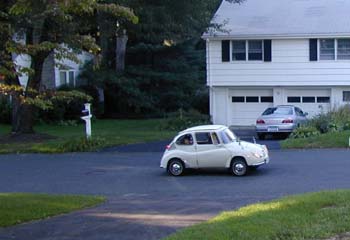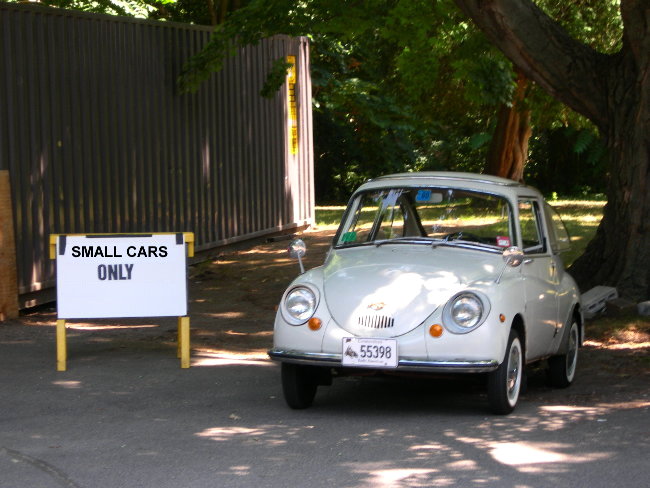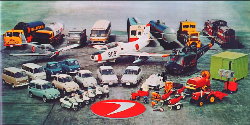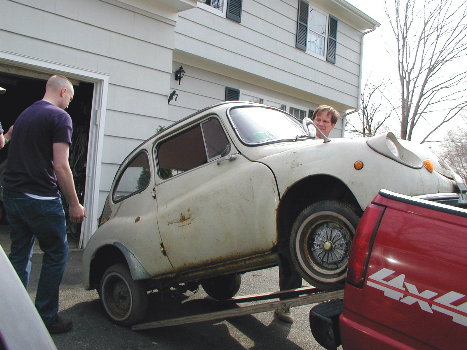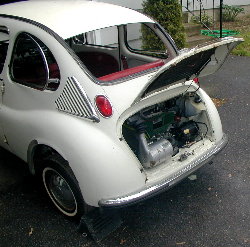
|
1969 Subaru 360 1969 Subaru 360 Deluxe Sedan The newest addition to our classic transportation collection is the 1969 Subaru 360 Deluxe "Sedan" seen above. The 360 was a very popular car in Japan from its introduction in 1958 through the end of production in 1971/1972. Many people in Japan consider the Subaru 360 to be their Model T; the car responsible for putting their nation on wheels. At 9' 9" long, 51" wide and 925 lbs (971 lbs road ready) the Subaru 360 is a very light compact vehicle. The engine (designated EK-32) is a 356cc two cylinder, two stroke (oil injected), piston ported engine developing 25hp at 5,500 rpm. It is mated to a 4 speed overdrive transaxle. All 4 wheels have hydraulically actuated drum brakes and the rear two have a cable operated hand (emergency) break. Tires are diminutive 4.80 x 10" tube type. The fuel tank holds 6.6 gallons and gravity feeds the Hitachi carburetor. Ignition is via coil and Nippon Denso distributor. Automotive personality/entrepreneur Malcolm Bricklin was responsible for bringing several thousand 360's to the USA in the 1960's - MB is the same person responsible for the Bricklin debacle in the 1970's and Yugo fiasco in the 1980's. Honestly, the 360 was completely ill-suited to America's roads and people's tastes in the 1960's and it is no surprise that it did not sell well. At $1297.00 new, it compared to a nice used Falcon or Nova, much more acceptable vehicles to many people. A couple of thousand cars found homes with people willing to try something different but a very negative Consumer's Reports article in late 1969 killed off any potential sales thereafter. Reportedly in the mid 1970's several thousand unsold 360's, (after sitting for years on the docks in California), were dumped in the Pacific Ocean.
Frankly, the Subaru 360 is unlike any car I have ever owned, restored or driven. At 6'2" I find entry through the front opening (suicide) doors a bit tight, but once inside head & legroom are pretty good! Shoulder room is a bit cramped but no too bad, overall it reminds me of a Piper or Cessna once inside. There are not a lot of creature comforts, an optional AM radio is about the only "excess" on the car. The dashboard has a business like instrument pod with an optimistic 80 mph speedometer, fuel gauge and idiot lights for the generator and low 2-stroke oil. The engine uses a manual choke and starts easily - a bit of fiddling with the choke is needed when first underway. The gears, steering, breaking and performance is very similar to the VW 1200 Sedan (beetle) I had as a kid. (On paper the 360 actually has a more favorable power to weight ratio!) The car drives well and the 4 wheel torsion bar suspension does a good job, brakes are adequate. We do not push the car much above 50 mph and have not ventured onto I-95 or the parkway. There are members of the Subaru 360 Drivers Club who routinely drive 65 mph on interstates - I'm not brave enough to do this... yet. Due to the vehicles small size and light weight, we like to drive the car with headlights on and a maximum of alertness and care - an ill-fated meeting with an SUV would be very hazardous. While our experience has not delivered the 66 mpg originally advertised, we do get a consistent 40-45 mpg. One plus the 360 has over EVERY beetle I have ever been in is that the heater works - not great, but it does work! As of this writing we have logged over 400 miles of virtually trouble free driving - a testament to the fine engineering of Fuji Heavy Industries (Subaru's parent company).
Here is a shot from a 360 brochure showing all the products Fuji Heavy Industries manufactured at the time. (approx 1968) Working on the 360 takes a lot of (mental) adjustment when you are used to large American antique cars, or even my favorite tractor-like Volvo's. Honestly, I have learned a lot from the 360 restoration project, my observations are as follows:
While I don't think I would want a Subaru 360 as my only vehicle, I have to give it high marks for what it was intended: a compact, light weight and economical vehicle - its performance, ride and quality exceed my expectations. It is great for quick trips to the store or around town - when a moped is not suitable. The best thing about 360 ownership is, honestly, I could not drive a Dusenberg J and get the looks and attention the 360 brings whenever/wherever I drive it! Subaru Specialty Tools Inventory Here is the story of how our Subaru 360 came to us, and where it has been!
Unloading the 360 when it came to us in April 2004 (It fit in the back of my Chevy pickup!) Reportedly the car was purchased new in late 1968 or early 1969 to be used by a family as an extra car. After a few months the engine lost power and stopped running and the car sustained a dent in the left front fender & hood. From the inspection decal on the windshield we know that the car passed its Fall 1969 Massachusetts safety inspection at a station in Springfield. The odometer registers 8,129.4 miles and the car did not have its registration renewed when it expired on 12/31/69. Sometime in 1970 a car collector purchased the 360, removed the engine and found a new left front fender. The engine turned out to have burned a hole in the #2 piston. This was replaced, the bore lightly honed and new rings installed. The heads were not reinstalled and the necessary parts, including new head gaskets, were dumped in a couple of boxes and placed in the back seat. (At some point a box with the expansion chamber, muffler, some of the engine air ducts and other miscellaneous parts went MIA) The car, sans engine, was taken to the Westover Air Force Base in Chicopee MA where the collector had rented a 40' x 80' underground bunker to store his auto projects. This bunker was built during the Eisenhower administration to house nuclear warheads for the fleet of B-52's stationed there. As ICBM's became the main deterrent, the bunkers (Appeared to be over 20) became superfluous and were rented out. A security guard explained to me that the walls were a minimum of 14' thick steel reinforced concrete with a lead shielding. The double set of 8' x 10' blast doors weighed more than a fleet of 360's and the bunker could survive a 5 megaton explosion within the perimeter of the complex. During the fall of 2003 my friend Colin happened to strike up a conversation with the aforementioned collector at an antique car show. (where Colin was showing his 1957 BMW Isetta) Numbers were exchanged and discussions lead to a trip to see some of the collector’s vehicles - how we ended up getting the ‘bunker tour”. Apparently loss of storage due to a clause in the Patriot Act (preventing civilians from renting property on military bases), required that he "thin out" his collection. A few days before Christmas we met at the collector’s house; interesting cars like a ’61 DKW, ’53 Willy’s Aero, a Panhard and a Citroen DM were in various degrees of decomposition in the yard. It was a 15-minute drive to the Westover Airforce base, we passed through the checkpoint and drove by 8-10 doors into the hillside on our way to bunker #18. It was all three of us could do to open the blast doors and peer into the gloom of the bunker. Our flashlights provided the only lighting; cars were packed in, some on top of trucks and even 3 model A Ford bodies stacked like cordwood! The vehicles contained ranged from the mundane ('87 Isuzu Trooper) to antique (’37 Olds and 30’s Cadillac). We were forced to walk over the cars to inspect the contents. Other finds were a ’46 Fiat, ’56 Sunbeam Talbot and, of course, the Subaru 360. In short order a deal was struck and arrangements were made to pick the car up the weekend after Christmas. (Getting the car out was an ordeal – ever try and move a ’56 Holiday 88 that all 4 wheels are frozen?) Actually my friend Pete purchased the car (I was under orders from “The Skipper" NOT TO DRAG HOME ANYTHING!!!!!!!!!) When Abby reviewed the pictures & video we shot in the bunker she thought the 360 was so cool she questioned why I did not buy it… Well… a couple of months went by and Pete decided to pursue other interests - the 360 had not been moved since we unloaded it so he phoned me to see if I would be interested. With Abby’s enthusiastic blessing the car passed to us. The restoration was tough since most of the parts to the 360 are unique and can not be substituted with other things. I owe a great debt of thanks to my college friend Steve and his father Claude - a former Subaru dealer in the 1960's. They gave me 400 pounds worth of NOS and used parts, manuals as well as all the Subaru Specialty Tools Inventory - saved all these years since they closed the dealership in the early 1970's. I also owe Ed at the Subaru 360 Drivers Club a hearty thanks for all his advice and help. Without the help of these folks there would have been no way this car ever would have been back on the road. The car is now registered and running well but there are still a few things to do! Follow my restoration Running
for the first time in 34+ years! (June 2004) Art's Auto Rollcall | 1966 Lincoln Convertible | My Subaru Project | Volvo Corner
|
